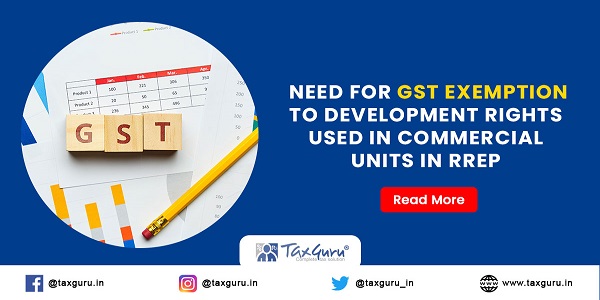Background – Development Agreement
In apartments construction business, it is a usual practice that the land owner transfers development rights in the land to a promoter. In consideration, the promoter allots constructed units to the land owner. The promoter constructs some extra units and sells the same.
The Land owner, thus sells (transfers) development rights (D.R.) to the promoter / developer in consideration of getting residential flats / commercial units from the promoter / developer.
The promoter transfer constructed units to the land owner. In GST terminology, the promoter supplies the construction service to the land owner in consideration of receiving the D.R. from the land owner.
Page Contents
RREP and REP :
GST rate notification 11/2017 – Central tax (Rate) uses these two terms. W ithout going into the jargon of legal definitions, in simple words :
RREP:
Residential Real Estate Project means a project wherein the carpet area of commercial units is less than or equal to 15% of total carpet area. In other words, it is a predominantly residential project with some nominal (upto 15%) allowance of commercial units (apartments).

The significance of RREP is that, in RREP, the effective GST rate applicable to commercial units is at par with non affordable residential units (5%) as against effective rate of 12% in REP.
REP:
Real Estate Project simply means a mixed project having residential and commercial units (apartments) in which commercial units are more than 15% in carpet area. The significance of REP is that in REP, the commercial units are liable to GST at effective rate of 12%.
GST Liability on the flats / commercial units
GST is payable on sale of flats / commercial units if any part of the consideration is received before issue of occupancy / completion certificate or first occupation of the unit, whichever earlier. (CGST Act Schedule II clause 5 b). In case of flats / units given by the promoter to the landowner, entire consideration viz. D.R. is received by the promoter before issue of CC. Therefore, GST is payable on the flats / units so transferred to the land owner. Similarly, in respect of flats / units sold to outsiders, GST on the same will be payable if any part of the consideration is received before the issue of C/C or first occupation, whichever is earlier. If entire consideration is received after issue of C/C or first occupation whichever is earlier, then GST is not payable on the sale of these flats / units as it becomes the sale of immovable property. (CGST Act Schedule III clause 5).
With effect from 1st April 2019, output GST rate on flats and commercial units are as under :
| Type of project | Type of apartment (Unit) | Effective GST Rate | Is ITC allowed | Entry No. in notification 11/2017 – Central tax (Rate) |
| RREP | Residential – affordable | 1% | No | 3 (i) |
| RREP | Residential – non affordable | 5% | No | 3 (ia) |
| RREP | Commercial | 5% | No | 3 (ib) |
| REP | Residential – affordable | 1% | No | 3 (ic) |
| REP | Residential – non affordable | 5% | No | 3 (id) |
| REP | Commercial | 12% | Yes | 3 (if – i) |
Note :
1. Affordable, in simple words means a unit whose carpet area is not more than 60 Sq. Mtr. in metro cities and 90 Sq. Mtr. for other cities and gross amount charged is not more than Rs.45 Lakh.
2. Non affordable, in simple words means a unit whose carpet area is more than 60 Sq. Mtr. in metro cities and 90 Sq. Mtr. for other cities or gross amount charged is not more than Rs.45 Lakh.
3. ITC is allowed for commercial units in REP but not in RREP because the output GST rate is lower (5%).
4. How to calculate effective rate from the notification : The GST rate specified in the notification is for the Central Tax; equal amount is added for state tax and then 1/3rd amount is deducted towards land value as stated in Para 2 of the notification to arrive at the effective rate of GST. Eg RREP affordable residential rate specified in the notification is 0.75%. The effective rate is calculated as :
0.75 X 2 = 1.5. And 1/3rd thereof i. e. 0.5 is deducted towards land value and effective rate becomes 1%.
It can be seen from the above that the intention of the government is to treat the commercial units in RREP at par with residential units as a lower GST rate of 5% against that of 12% is allowed. But as a result, ITC is disallowed.
GST liability of Development Rights (D.R.)
Whether D.R. should be taxable or not is a disputed matter. This is because it is argued that D.R. are rights in land and thus a part of immovable property and hence cannot be subjected to GST. However, the scheme of GST Act as it stands today treats D.R. as taxable and we will proceed with that position.
D.R. are taxable at 18% as service. The general rate applies. However, it is capped to the 1% or 5% of the value of the residential unit.
Valuation of D.R. is done as per Para 2 of the notification 12/2017 – Central tax (rate). In simple words, the value of D.R. is the sum total of the value of all units allotted to the landowner.
GST on D.R. is payable by the promoter under RCM vide notification 13/2017 – Central Tax (rate) Sr. No. 5B.
GST exemption for Development Rights (D.R.)
Vide notification 12/2017 – Central tax (rate) Sr. No. 41A, an exemption is allowed to D.R. used in residential units if output GST is paid on the residential units i. e. if any part of the consideration is received before C/C or first occupation. If the units are sold post completion, then output GST is not payable, but GST on D.R. is payable which is 18% of value of DR or 1%/5% of the value of the residential unit whichever is less. Thus, effectively, the promoter either pays output GST or pays GST on D.R. under RCM. There is no double taxation in case of residential units.
GST under RCM In case of commercial units
Whether the commercial units are in REP or in RREP, GST is payable on the the D.R. used in commercial units. It is payable at 18% on the value of the D.R. used in the respective commercial unit. In case of commercial units in REP, the promoter gets ITC of GST paid on D.R. Therefore, it is not a cost to him. He only pays output GST.
Double taxation in case of commercial units in RREP
For D.R. used in commercial units in RREP, the promoter has to pay GST on the D.R. @ 18% of the value of the D.R. used in the respective commercial units. But he cannot avail ITC thereof. Commercial units in RREP are treated at par with residential units for output tax purpose – i. e. the rate of GST is 5% without ITC. But a very big difference is that for residential units, exemption is given to GST on D.R. used in residential units, which is missing for D.R. used in commercial units in RREP. This is increasing the cost significantly (almost approximately 18% of the value of the commercial unit)
Many RREPs may come in near future
Now with the economy gradually recovering and the demand for residential buildings increasing, more RREPs are likely to come in near future. Especially, in case of redevelopment of residential buildings which are at present 100% residential, may have some commercial units after redevelopment. And most likely such buildings will be RREP as allowance of commercial units will be nominal (less than 15%) as per T.P. Rules.
Suggestion
It seems an inadvertent miss out that exemption to GST on D.R used in commercial units (apartments) in RREP is not given. The government may kindly consider to provide the same by amending entry 41A of notification 12/2017 – Central tax (rate) by covering commercial units in RREP also.
*****
Disclaimer : The contents of this article are for informative or educational purpose only and though every precaution is taken for correctness, no responsibility or liability for the same is accepted. This article is written in simple language for easy understanding. For legal purpose, kindly refer to the actual notifications, Rules and the Act.





